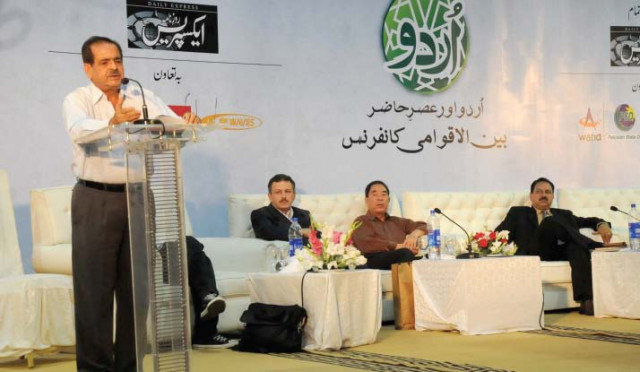Urdu, the language of the feminist, sparks hot debate at Express conference
Poets still love Heer - they should snap out of this stereotype, says fiction writer.

Urdu, the language of the feminist, sparks hot debate at Express conference
An active and heated debate took over the Express Urdu conference on its second day Saturday.
The topics of discussion ranged from the role of women in Urdu contemporary literature to the potential of the language and challenges it faced today.
In her thesis on gender discrimination in Urdu literature, eminent Pakistani writer and columnist Zahida Hina said that earlier, women were not allowed to write and if they did, then they were not allowed to publish the book or poem under their own name. Female writers, however, struggled and showed that they did have the courage to have their name published against whatever they wrote.
Poet Dr Saleem Akhtar’s thesis was declared to be quite witty as he discussed the different ways in which a man suffocated talent in a woman. “A man can decorate his wife with gold and diamonds but he cannot accept her as an independent personality,” he said. “Only courtesans wrote poetry because they were nobody’s wives and were independent breadearners.”
He added that the restrictions placed on housewives had led to an empty talentless void which was filled by courtesans. He dismissed their contribution to Urdu and said that the topics they selected were often quite vulgar. Akhtar said that is was impressive that female writers had made a place for themselves despite living in a society where women were buried alive and married to the Holy Quran.
Indian intellectual Zubair Rizvi said that a writer always waited for the right moment. “The writer waits for a moment when society is ‘pregnant’ with filth, injustice and social disparity, that is when the writer sits down with his pen,” he said.
Rizvi added that women in Hyderabad, India had written extensively on authoritarian rulers and womanising.
Indian fiction writer Jilani Bano said that she had expected the speakers to talk more about the problems faced by the contemporary Urdu female writer. “Urdu poets still love Heer, Sassui, Shireen and Cleopatra. They should snap out of this stereotype,” she said. “Literature is a strong medium and should be used to convey messages to the masses.”
Bano urged her Pakistani counterparts to take an initiative and discuss the issues they faced so that they could come up with a plan of action together.
After the papers were read aloud, speakers suggested that they should take steps to protect the Urdu language as soon as possible.
A technologically challenged language
According to Chinese delegate Prof. Tang Mengsheng, Urdu was much more complicated than Chinese. He added the basic grammar and composition rules of the language were being ignored in the country. The Turkish delegate Khalil Tauq Err said that he would not greet the audience with a traditional Asalam-o-Alaikum as no one had replied to his greeting the day before. He added that Urdu could not be imposed as the official language of the country till all schools used it as the sole medium of instruction. Err went on to say that in most developing countries they preferred to use a foreign language as their national language and lacked the courage to use their own. He added that such countries were bound to be ruined. “Would a non-English army defend your country?” he said. “The Pakistani people have to decide which language can keep them united, Sindhi, Balochi, Punjabi, Pashto or Urdu.”
Fiction writer Shakeel Adil Zada said that the language was being limited to poetry and fiction while course books in Urdu were not available to students.
Published in The Express Tribune, October 2nd, 2011.



















COMMENTS
Comments are moderated and generally will be posted if they are on-topic and not abusive.
For more information, please see our Comments FAQ